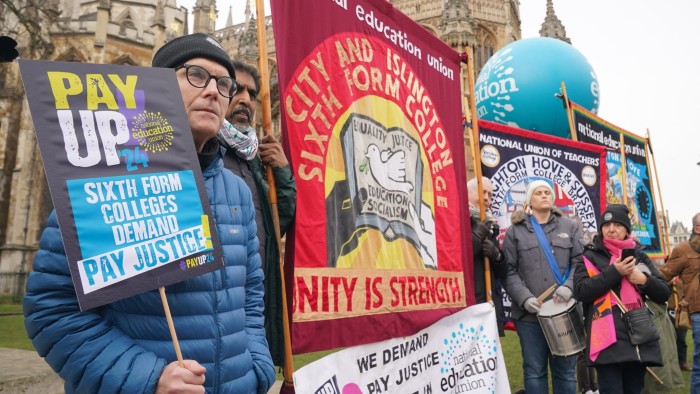Unlock the Editor’s Digest for free
Roula Khalaf, Editor of the FT, selects her favourite stories in this weekly newsletter.
Public sector workers in England will receive pay awards of up to 4 per cent this year in a settlement that is likely to lessen tensions with unions but place fresh strains on departmental budgets.
Doctors and teachers will receive a 4 per cent pay rise, in line with recommendations made by the independent public sector pay review bodies, the government said on Thursday.
Most other NHS workers will receive a 3.6 per cent pay uplift, with a 3.25 per cent increase for senior managers. Lower-paid school staff, such as teaching assistants and caretakers, will receive a 3.2 per cent award.
The Cabinet Office also published guidance for government departments setting pay for civil servants, saying they could make average pay awards of up to 3.25 per cent, with flexibility to award an extra 0.5 per cent to low-paid staff, those with scarce skills or to priority areas.
The awards mean public sector pay is likely to rise roughly in line with that of private sector employees over the year ahead. But it will still barely be enough for pay to outpace inflation, which jumped to 3.5 per cent last month and is expected to fall back only gradually.
“If it hadn’t been for the spike in inflation in April, we could have banked this as a victory,” said one public sector union official. “Most unions will be able to live with this, but the optics are a bit more difficult.”
Chancellor Rachel Reeves had given government departments funding to cover a 2.8 per cent average pay rise, meaning that the pay awards will put further pressure on squeezed Whitehall budgets.
One Treasury official said: “We have said there will be no additional funding for pay. This will have to be paid for from within existing budgets. This is about choices and allocations.”
Ben Zaranko, associate director at the Institute for Fiscal Studies, said the NHS pay deal was not “a million miles away” from what ministers saw as affordable, limiting the fiscal impact.
But higher pay now would make pay negotiations next year even harder, he added, with implications for the departmental spending plans to be announced next month.
Reeves, who will publish the results of a Whitehall spending review on June 11, expects departments to cut their civil service headcounts as part of the process of finding savings to stay within a tight overall spending envelope.
The Department for Education said schools would be expected to find the first 1 per cent of the pay award through improved productivity, with the government providing additional investment of £615mn — with an extra £160mn for further education colleges.
Natalie Perera, chief executive at the Education Policy Institute, said there would be “considerable concern” about how schools would find further savings, and about “the unanswered question about what else has been cut in the education department”.
Daniel Kebede, general secretary of the NEU teachers’ union, said that despite the extra money, “it is still the case that the pay award is not fully funded”. This would lead to cuts in provision in many schools, he said, adding that the union was likely to register a dispute with the government on the issue of funding unless the position changed.
There was also concern from health leaders that the pay increases would put new strain on overstretched NHS budgets, with organisations predicting significant overspending in the next financial year.
A government official insisted NHS pay rises “will be fully funded” and there would be “no frontline service cuts”.
“We budgeted for most of it and the rest we can afford to cover because of the savings we’ve been making,” they added.
Philip Banfield, chair of the ruling council of the British Medical Association, which represents doctors, described the pay award as “derisory”.
“Doctors’ pay is still around a quarter less than it was in real terms 16 years ago and today’s ‘award’ delays pay restoration even more,” he said.




